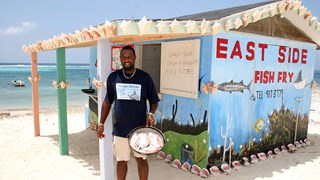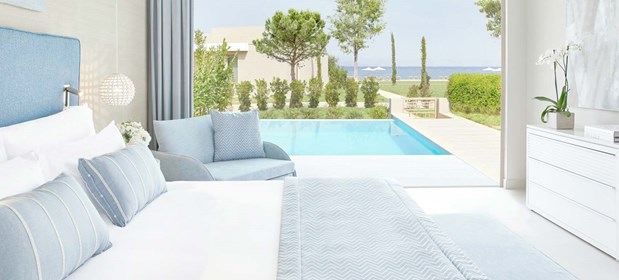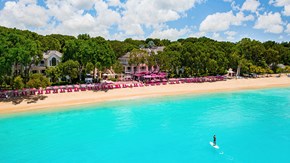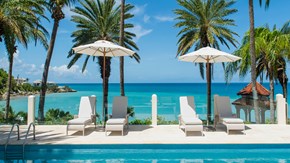By thinking a little about your holiday destination before you travel, and taking some simple steps when you are there, you can gain so much more from your holiday. You will also be making a positive contribution to the people and the places you visit.
Don't waste water
Water is a precious commodity in Grenada. You can help conserve water supplies by taking showers instead of baths and not insisting that your towels are laundered every day. If water supplies get very low – usually towards the end of the dry season of January to May – hoteliers sometimes have to resort to paying for tankers to drive in water supplies. The cost of this ultimately adds to the cost of holidays. During the dry season hoteliers may also have to turn off the water during the day. The more water visitors use, the less there is for local agriculture, which has serious effects on the income of local farmers and their families.

Be wary about waste - especially plastic and batteries
Grenada’s tap water is drinkable so there is no need to buy drinking water bottled in plastic. Grenada’s waste disposal methods are not sophisticated and the island strains to cope, especially with plastic. You’ll find shopkeepers enthusiastic about offering you plastic bags. It helps if you can keep their use to a minimum and re-use them whenever possible. Discarded plastic bags that have blown into the sea have been known to choke turtles who mistake the bags for jellyfish.
There are no proper disposal facilities for batteries so take used ones home with you. You can also help ease the strain by travelling to Grenada with as little packaging as possible. Simply remove unnecessary external packaging from anything you’re taking with you, before you leave home.
Don't litter
Dropping litter is a fineable offence in Grenada.
Save electricity whenever you can
Turn off lights, fans and air conditioning whenever you leave your room. This will help relieve the pressure on the local resources that Grenadians struggle to finance and maintain.

Don't buy souvenirs made from endangered species
Do not remove shells from the beach or coral from the sea. Take care to avoid buying souvenirs you may be offered that are made from these endangered species. It is illegal – and punishable by fine – to possess corals, some seashells and anything made from turtles (meat or shells) and other wildlife.
Help protect the local plants and flowers
Some local plants and flowers are also protected. However you can buy boxed fresh flowers – heliconias, anthuriums, lilies and orchids – that are treated, packaged and certified for export. Buying these flowers means that you are helping support local businesses and encouraging their cultivation so that their supply is not destroyed.
Don't buy Arawak relics
Don’t buy any Arawak relics. Fascinating Arawak tools and bones are discovered at archaeological sites and you may be offered some for sale. It is almost certain that anything offered for sale has been stolen from the sites. Buying these stolen goods encourages more theft. At the Grenada National Museum and the Carriacou National Museum you can see the Arawak artefacts that haven’t been stolen.
Help turtles survive
Green, hawksbill, loggerhead and leatherback turtles are all found in the waters around Grenada, and the endangered leatherback and hawksbill in particular use the beaches for burying their eggs. Try not to disturb the nests. Flashing cameras and approaching too closely can scare the female turtles and prevent them from laying. Lights can disorientate the hatchlings that emerge after incubation in the sand, so they fail to navigate to the sea and they die. Unfortunately in Grenada it is still legal to hunt some species of sea turtle for part of the year, although there is now a complete ban on collecting all turtle eggs. Visitors can help by not buying turtle products (meat, eggs, shells) that they may see in the markets. Visitors can also join a turtle watching trip, which are offered by some local groups and provide alternative economic opportunities to communities that may have historically hunted turtles.
Consider how you tip
Please be generous when you tip good service. The wages of an experienced hotel waiter are often less than those of other skilled jobs, and tips can make a big difference to the locals’ standard of living. Hotel service charges are not necessarily shared between all the hotel staff.

Support the local economy
Many goods on the island are imported but you can support the local economy by choosing to eat locally-grown foods and buying souvenirs that have been made or grown in Grenada. In hotel restaurants, if you choose to try locally grown foods like dasheen, callaloo, breadfruit and plantain you’ll be supporting the local economy rather than adding to the economic imbalance of importing foreign goods.
Enjoy some life outside the all-inclusives
If your hotel is all-inclusive, take some time to eat and drink outside your hotel. Eating and drinking outside your hotel can be an enjoyable way to learn something about the country as well as helping local people and the country’s economy gain some benefit from tourism.
Ask permission before you photograph a Grenadian
Always ask before taking photographs of people and their homes, and respect their wishes if they refuse.
Don't encourage begging
The Grenadians are anxious to keep their visitors from being hassled by opportunists. Don’t encourage them by giving money to anyone who begs, or who demands money in return for being photographed.
How to give responsibly
Making a donation to a local school, library or children’s home has a greater and longer lasting effect and is less disruptive than giving directly to begging children.

Respect local sensibilities
Local custom dictates that you cover up away from the beach, especially in towns and supermarkets. Topless sunbathing is not allowed.
Relax and say hello!
Grenadians are generally very polite and like to acknowledge strangers and greet them. Do reply. They are offended when strangers don’t return their greeting. Grenadians also expect to be greeted before being asked a question like directions. The crime rate on the island is very low.
This guide is reproduced courtesy of The Travel Foundation. For further information, visit their website, Make Holidays Greener.















